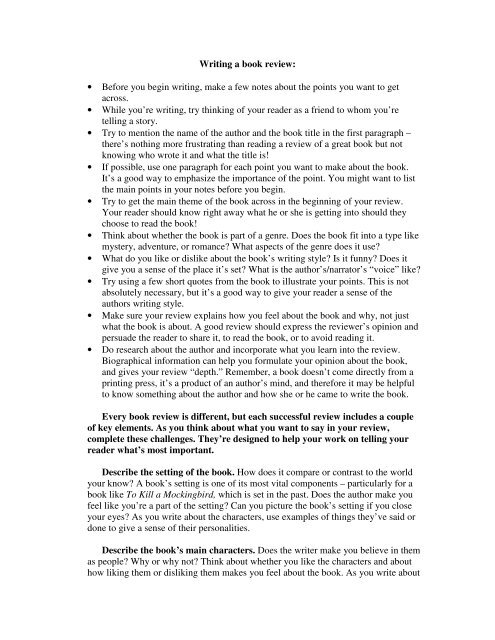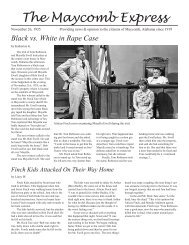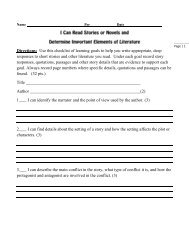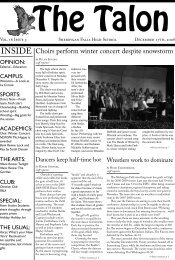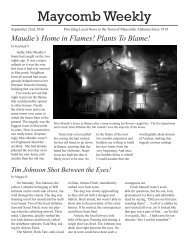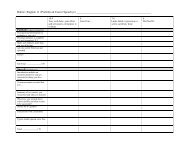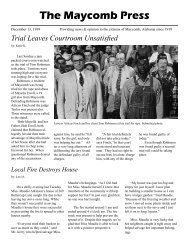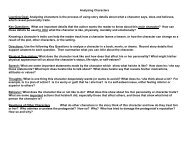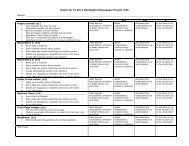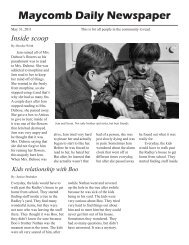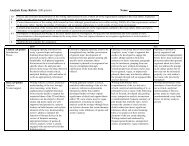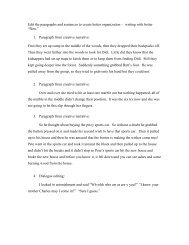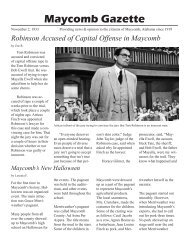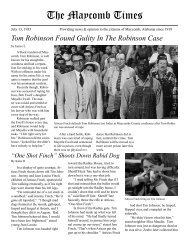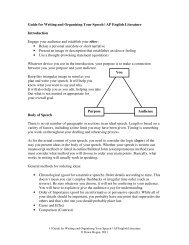Writing a book review: ⢠Before you begin writing, make a few notes ...
Writing a book review: ⢠Before you begin writing, make a few notes ...
Writing a book review: ⢠Before you begin writing, make a few notes ...
Create successful ePaper yourself
Turn your PDF publications into a flip-book with our unique Google optimized e-Paper software.
<strong>Writing</strong> a <strong>book</strong> <strong>review</strong>:<br />
• <strong>Before</strong> <strong>you</strong> <strong>begin</strong> <strong>writing</strong>, <strong>make</strong> a <strong>few</strong> <strong>notes</strong> about the points <strong>you</strong> want to get<br />
across.<br />
• While <strong>you</strong>’re <strong>writing</strong>, try thinking of <strong>you</strong>r reader as a friend to whom <strong>you</strong>’re<br />
telling a story.<br />
• Try to mention the name of the author and the <strong>book</strong> title in the first paragraph –<br />
there’s nothing more frustrating than reading a <strong>review</strong> of a great <strong>book</strong> but not<br />
knowing who wrote it and what the title is!<br />
• If possible, use one paragraph for each point <strong>you</strong> want to <strong>make</strong> about the <strong>book</strong>.<br />
It’s a good way to emphasize the importance of the point. You might want to list<br />
the main points in <strong>you</strong>r <strong>notes</strong> before <strong>you</strong> <strong>begin</strong>.<br />
• Try to get the main theme of the <strong>book</strong> across in the <strong>begin</strong>ning of <strong>you</strong>r <strong>review</strong>.<br />
Your reader should know right away what he or she is getting into should they<br />
choose to read the <strong>book</strong>!<br />
• Think about whether the <strong>book</strong> is part of a genre. Does the <strong>book</strong> fit into a type like<br />
mystery, adventure, or romance? What aspects of the genre does it use?<br />
• What do <strong>you</strong> like or dislike about the <strong>book</strong>’s <strong>writing</strong> style? Is it funny? Does it<br />
give <strong>you</strong> a sense of the place it’s set? What is the author’s/narrator’s “voice” like?<br />
• Try using a <strong>few</strong> short quotes from the <strong>book</strong> to illustrate <strong>you</strong>r points. This is not<br />
absolutely necessary, but it’s a good way to give <strong>you</strong>r reader a sense of the<br />
authors <strong>writing</strong> style.<br />
• Make sure <strong>you</strong>r <strong>review</strong> explains how <strong>you</strong> feel about the <strong>book</strong> and why, not just<br />
what the <strong>book</strong> is about. A good <strong>review</strong> should express the <strong>review</strong>er’s opinion and<br />
persuade the reader to share it, to read the <strong>book</strong>, or to avoid reading it.<br />
• Do research about the author and incorporate what <strong>you</strong> learn into the <strong>review</strong>.<br />
Biographical information can help <strong>you</strong> formulate <strong>you</strong>r opinion about the <strong>book</strong>,<br />
and gives <strong>you</strong>r <strong>review</strong> “depth.” Remember, a <strong>book</strong> doesn’t come directly from a<br />
printing press, it’s a product of an author’s mind, and therefore it may be helpful<br />
to know something about the author and how she or he came to write the <strong>book</strong>.<br />
Every <strong>book</strong> <strong>review</strong> is different, but each successful <strong>review</strong> includes a couple<br />
of key elements. As <strong>you</strong> think about what <strong>you</strong> want to say in <strong>you</strong>r <strong>review</strong>,<br />
complete these challenges. They’re designed to help <strong>you</strong>r work on telling <strong>you</strong>r<br />
reader what’s most important.<br />
Describe the setting of the <strong>book</strong>. How does it compare or contrast to the world<br />
<strong>you</strong>r know? A <strong>book</strong>’s setting is one of its most vital components – particularly for a<br />
<strong>book</strong> like To Kill a Mockingbird, which is set in the past. Does the author <strong>make</strong> <strong>you</strong><br />
feel like <strong>you</strong>’re a part of the setting? Can <strong>you</strong> picture the <strong>book</strong>’s setting if <strong>you</strong> close<br />
<strong>you</strong>r eyes? As <strong>you</strong> write about the characters, use examples of things they’ve said or<br />
done to give a sense of their personalities.<br />
Describe the <strong>book</strong>’s main characters. Does the writer <strong>make</strong> <strong>you</strong> believe in them<br />
as people? Why or why not? Think about whether <strong>you</strong> like the characters and about<br />
how liking them or disliking them <strong>make</strong>s <strong>you</strong> feel about the <strong>book</strong>. As <strong>you</strong> write about
the characters, use examples of things they’ve said or done to get a sense of their<br />
personalities.<br />
Give <strong>you</strong>r reader a taste of the plot, but don’t give the surprises away.<br />
Readers want to know enough about what happens in a <strong>book</strong> to know whether they’ll<br />
find it interesting. But they never want to know the ending! Summarize the plot in a<br />
way that will answer some questions about the <strong>book</strong>, but leave other questions in the<br />
reader’s mind. You may want to <strong>make</strong> a list of questions about the <strong>book</strong> before <strong>you</strong><br />
<strong>begin</strong>.<br />
Source: Scholastic


